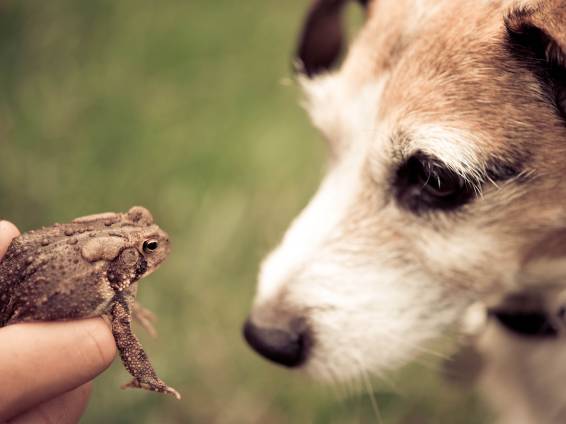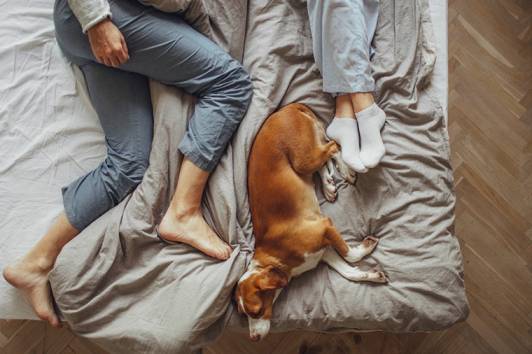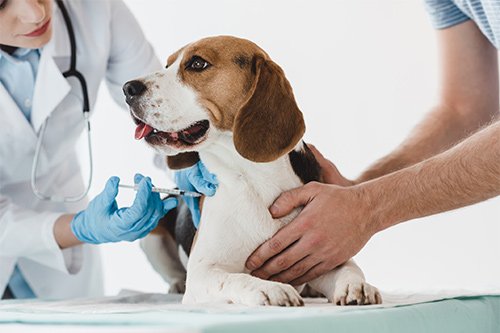Have you ever noticed your dog seems to be active in his sleep? Have you noticed he makes movements and maybe even growls or whimpers in his sleep? Do dogs have dreams? These are the questions, among others, that we’ll take a look at in this article. Read on to learn what’s going on when your fur baby’s sleeping.
Connect with a verified veterinarian in minutes. Licensed vets are available 24/7 to answer your questions. No need to worry about your furry family member.
Do Dogs Have Dreams?
If you’ve been a pet parent for quite a while, then you’ll have noticed that your pup can be quite active during sleep. Maybe you’ve noticed him paddling his paws, twitch his muscles, bark, etc. You may especially notice this if he sleeps with you each night. You’ve probably come to the conclusion that he’s dreaming. However, if you’re new at being a pet parent, you may wonder what’s going on when your dog sleeps. Is he having a dream or is it the sign of a health issue? Scientists have had the same questions and have done experiments to see if dogs have dreams like their humans.
What are Dog Dreams?
Dreams are the subconscious images that come to us during sleep. Dreams may include sounds, images and other types of sensations. You might think of dreams as a form of story that our brain puts together. Dreams can be fun, scary and many don’t even make sense.
The reasons we dream area varied:
- Our mind may be processing information from our day, helping us to make connections and learn as we sleep.
- Dreams may be a form of psychotherapy, helping us to cope with stress and other issues.
- Dreams may also show us our desires and wishes.
There’s still much we don’t understand about dreams, but one things researchers have found is that animals, like us, have dreams.

Review symptoms, medications & behavior to keep your pets healthy with a Vet Online in just minutes.
Ask a Vet Live NowDog’s Phases of Sleep
In order to understand sleep and how it works, we need to review some basic information about sleep phases. When we sleep, we go through a cycle that includes several phases:
Phase 1. Light sleep: during this phase, we may have slow eye movements and reduced muscle movement. This phase accounts for 4% to 5% of our total sleep time.
Phase 2. Slowing down: during this phase, eye movements tend to stop and our brain waves slow down. There may be occasional bursts of rapid waves. This stage accounts for about 45% to 55% of our sleep time.
Phase 3. Slowing down even more: our brain waves slow down even more. These types of waves have a name—they’re called delta waves. These may be mixed up with faster and smaller waves. This phase comprises about 4% to 6% of our total sleep.
Phase 4. Delta waves only: during this phase, the brain goes into delta wave mode. This stage, combined with phase 3, are when we’re deep asleep. It can be hard to wake a person during this stage. This phase comprises about 12% to 15% percent of our sleeping time.
Phase 5. REM: stands for Rapid Eye Movement. During this phase, we breathe more rapidly, with irregular and shallow breaths. Our eyes move in all directions quite rapidly and our arms and legs become temporarily paralyzed. Also during this phase, our blood pressure and heart rate increase. This is the time of our sleep phase that we dream. This stage accounts for 20% to 25% of our sleeping time.
During REM sleep, we can experience pleasant dreams, dreams that are completely bizarre and make no sense, or we can have nightmares. This seems to hold true for all mammals—from humans and dogs, to even rats and other small mammals.
Dog’s Brain Structure and Dreaming
Most mammals have brains that are similar, including humans, dogs and rats. The part of the brain responsible for our dreams is the brainstem, also called the pons. In fact, the pons actually keeps us from literally acting out our dreams. Dogs, cats and other mammals, including rats, have the pons where it seems to operate in the same way as it does in humans.
Rat Experiments
Researchers have done dream experiments with rats. In one experiment, rats spent an entire day running in a maze. During this time, scientists watched the rats’ brain activity while they were in the maze and then compared the rats’ brain activity when they were in REM sleep. Later, when the rats were sleeping, the pons area of the brain was deactivated, and scientists found the rats were making movements which indicated they seemed to be reliving their day in the maze.
Scientists believe that if rats have these types of dreams, then dogs surely have dreams. Their brains are even more complex than rat brains. They have surmised that dogs must dream about their daily activities, too. In fact, researcher indicates that our dogs dream about common dog activities. So, when you see your dog moving and twitching while he sleeps, he’s probably having a dream about what he did during the day.
If he was playing with you, chasing and playing with another dog, etc. these are probably what’s taking place as he dreams. They may even be dreaming about past events.
What do Dogs Dream About When They Bark?
That’s a good question! Your pup could be chasing off a burglar, barking a with another dog, etc. It’s very normal, so don’t worry if you notice this behavior. It doesn’t necessarily mean he’s having a bad dream.
Do Dogs Have Nightmares?
Yes, it’s possible for dogs to have nightmares. We have nightmares, so it’s completely realistic to think that dogs do have bad dreams, too.
Here are the signs your dog could be having a nightmare:
- Your dog may growl or bark (not a friendly bark—dogs can also bark in fear)
- Your pup may even howl, whine or whimper
- Your canine company
- He may have twitchy paws
- Your dog may breathe very fast
- Your fur baby may wake all of a sudden from a deep sleep, as if startled
These could all be indications your dog is having a nightmare.
Should I Wake my Dog If He’s Having a Nightmare?
Most vets say it’s better to let your dog sleep through the experience, unless you believe he will hurt himself or others, or if he seems to be having a seizure, etc. Dogs, just like people, are often disoriented when they first wake up, especially if they’re woken during REM sleep and they’ve been dreaming.
When an animal is scared and disoriented, it may lash out, just as we do if we’re in a similar state. You don’t want your dog to bite, hit or claw you or anyone else. So, it’s best to let him sleep through it. You can comfort him when he wakes up. He’ll love to your cuddling and soothing for sure!
Can Dogs Suffer from Night Terrors?
Yes, dogs can experience and suffer from night terrors. In fact, it’s possible your pup could have a sleep disorder. Your dog may exhibit many of the same indications as for nightmares. You may also notice these dog night terrors symptoms:
- Dog woke up screaming
- Extreme fear
- Aggressive behavior
- Seems like he’s suffering pain
If your dog is regularly showing these types of behaviors during sleep, then it’s time to make an appointment with the vet. Your dog may have nothing wrong, but he could be experiencing a sleep disorder or even another type of health problem. The vet will likely do a complete physical to make sure your dog isn’t suffering from an underlying health problem. He may also run neurological tests to check for any type of seizure disorder, etc. Tests may include an EEG (which can show if these episodes are occurring during REM sleep; if so, then this would be an indication your fur baby has a sleep disorder). Tests may also include some type of brain imagery to make sure the brain is healthy.
Treatment of Canine Sleep Disorders
Treatment will depend on the type of issues your fur baby’s having and how severe they are. For instance, if these occurrences don’t happen very often and are not severe, then the vet may decide it’s best to let your pup sleep in a comfortable, confined area such as a crate or a small room. They will usually advise adding padding to the area, to help keep your dog from possibly injuring himself and to make the space more secure. As long as your pup isn’t hurting himself or others (your family or other pets), then taking a more conservative approach is one way to treat his night terrors. However, if your dog’s having severe episodes, that’s another story. You dog may need further treatment if:
- He has night terrors most nights, or several times a night
- He has intense bouts of night terrors or they are getting worse over time
- Your pup harms himself or others in the household during sleep
- He can’t be contained in the environment
Under these circumstances, your vet will more than likely recommend medication to help treat your dog’s REM sleep disorder. The vet may prescribe:
- Clonazepam (a benzodiazepine medication)
- Potassium bromide (an anti-seizure medicine)
Because dogs are individuals, they will react to these medications in different ways. They’re much like us. Some people can take a medication with no problems, others may be allergic, etc. Most dogs, however, respond well to treatment. The medications help the pup sleep better, with the night terrors being completely controlled. Other dogs may still experience symptoms, but these will be less often and not as intense. Then there are some dogs who don’t respond to medication; however, this is extremely rare.
If the medications don’t work, there are still options. The vet may choose to treat your fur baby with a type of medicine called a selective serotonin reuptake inhibitor (SSRIs). While these may work, some dogs can actually get worse. There’s no way to predict how a dog will react until he’s tried the medication.
Alternative Treatments For Dog Sleep Disorders
There are also alternative treatments that you can try, some of which can be used along with meds prescribed by the vet. Before looking into alternative treatments, be sure to check with your vet to make sure the alternative treatments won’t interfere or cause drug interactions with prescribed therapies and medications. Alternative treatments may include:
- Valerian root, lavender, melatonin, all of which are natural substances that are used to soothe, calm and help induce sleep. These substances should not be combined with any other medication prescribed from the vet without their knowledge. They could cause side effects that could be serious for your fur baby.
- Veterinary behavioral specialist: this is another option that your vet may also suggest along with other treatments. A veterinary behavioral specialist may offer suggestions on how to help your dog through specific techniques that help him relax and calm him before sleeping.
It’s best to always work hand in hand with your veterinarian, as they’re the best expert on your dog and his health. Usually it takes a combination of techniques to help soothe a dog so he can sleep comfortably without night terrors. So, dogs can dream, and they can have nightmares or even night terrors. Most of the time, dogs move their paws, their muscles may twitch, etc. as they dream. These are normal signs he’s probably dreaming about chasing that squirrel that provokes him in the backyard. It’s also normal for dogs to occasionally have nightmares. However, if your dog regularly seems to have night terrors or if you believe he’s having another type of disorder, such as seizures, then it’s time to see the vet and get a diagnosis. There is help for dogs who have night terrors.
We hope you and your fur baby sleep soundly and have only the best of dreams!
Connect with a verified veterinarian in minutes. Licensed vets are available 24/7 to answer your questions. No need to worry about your furry family member.

Kyoko
Kyoko is from a family of 3 and moved to New York with her parents and siblings when she was 13. Kyoko is fond of spending a great amount of time with pets, specifically her beagle Luna and cat Missy. Her boyfriend often complains that she spends too much time giving attention to their animals. Kyoko has written dozens of articles concerning pets and is aiming at owning a pet shop one day!
Review symptoms, medications & behavior to keep your pets healthy with a Vet Online in just minutes.
Ask a Vet Live Now



